| Season | 2009–10 | |
|---|---|---|
| ||
The following article presents a summary of the 2009-10 football season in Venezuela .
| Season | 2009–10 | |
|---|---|---|
| ||
The following article presents a summary of the 2009-10 football season in Venezuela .
This section will cover Venezuela's games from August 12, 2009 until June 2010.
KEY:
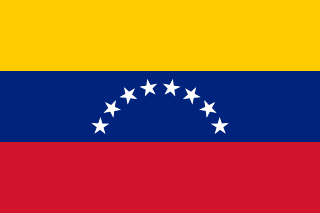
Venezuela, officially the Bolivarian Republic of Venezuela, is a country on the northern coast of South America, consisting of a continental landmass and many islands and islets in the Caribbean Sea. Venezuela comprises an area of 916,445 km2 (353,841 sq mi), and its population was estimated at 29 million in 2022. The capital and largest urban agglomeration is the city of Caracas.

The economy of Venezuela is based primarily on petroleum. Venezuela is the 25th largest producer of oil in the world and the 8th largest member of OPEC. Venezuela also manufactures and exports heavy industry products such as steel, aluminum, and cement. Other notable manufacturing includes electronics and automobiles as well as beverages and foodstuffs. Agriculture in Venezuela accounts for approximately 4.7% of GDP, 7.3% of the labor force and at least one-fourth of Venezuela's land area. Venezuela exports rice, corn, fish, tropical fruit, coffee, pork and beef. Venezuela has an estimated US$14.3 trillion worth of natural resources and is not self-sufficient in most areas of agriculture. Exports accounted for 16.7% of GDP and petroleum products accounted for about 95% of those exports.

The foreign relations of Venezuela had since the early twentieth century been particularly strong with the United States. However, since the election of Hugo Chávez as President of Venezuela in 1998, Venezuela's foreign policy differed substantially from that of previous Venezuelan governments. This change in foreign policy direction continues under the current president Nicolás Maduro.
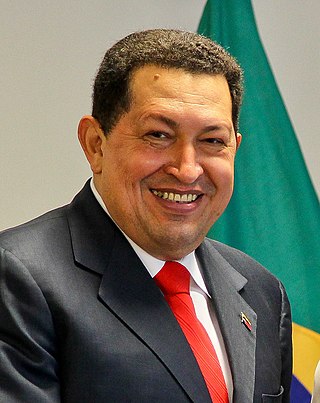
Hugo Rafael Chávez Frías was a Venezuelan politician and military officer who served as president of Venezuela from 1999 until his death in 2013, except for a brief period of forty-seven hours in 2002. Chávez was also leader of the Fifth Republic Movement political party from its foundation in 1997 until 2007, when it merged with several other parties to form the United Socialist Party of Venezuela (PSUV), which he led until 2012.

Caracas, officially Santiago de León de Caracas (CCS), is the capital and largest city of Venezuela, and the center of the Metropolitan Region of Caracas. Caracas is located along the Guaire River in the northern part of the country, within the Caracas Valley of the Venezuelan coastal mountain range. The valley is close to the Caribbean Sea, separated from the coast by a steep 2,200-meter-high (7,200 ft) mountain range, Cerro El Ávila; to the south there are more hills and mountains. The Metropolitan Region of Caracas has an estimated population of almost 5 million inhabitants.

Danny Lebern Glover is an American actor, producer and political activist. Over his career he has received numerous accolades including the Jean Hersholt Humanitarian Award from the Academy of Motion Picture Arts and Sciences, the NAACP's President's Award, as well as nominations for five Emmy Awards and four Grammy Awards.

The National Assembly is the legislature for Venezuela that was first elected in 2000. It is a unicameral body made up of a variable number of members, who were elected by a "universal, direct, personal, and secret" vote partly by direct election in state-based voting districts, and partly on a state-based party-list proportional representation system. The number of seats is constant, each state and the Capital district elected three representatives plus the result of dividing the state population by 1.1% of the total population of the country. Three seats are reserved for representatives of Venezuela's indigenous peoples and elected separately by all citizens, not just those with indigenous backgrounds. For the 2010 to 2015 the number of seats was 165. All deputies serve five-year terms. The National Assembly meets in the Federal Legislative Palace in Venezuela's capital, Caracas.

The Venezuela national football team represents Venezuela in men's international football and is controlled by the Venezuelan Football Federation (FVF), the governing body for football in Venezuela. They are nicknamed La Vinotinto. When playing at home in official games, they usually rotate between three stadiums: The Polideportivo Cachamay in Puerto Ordaz, the Estadio José Antonio Anzoátegui in Puerto La Cruz and the Estadio Pueblo Nuevo in San Cristóbal. In friendly matches, they tend to rotate between the rest of the stadiums in the country.

Globovisión is a 24-hour television news network. It broadcasts over-the-air in Caracas, Aragua, Carabobo and Zulia on UHF channel 33. Globovisión is seen in the rest of Venezuela on cable or satellite and worldwide from their website. Some of Globovisión's programs can be seen in the United States on cable network Canal Sur and TV Venezuela, a channel offered in DirecTV's Para Todos package. In Latin America, Globovision can be seen in Argentina, Colombia, Chile, Ecuador, Peru, Uruguay and other territories as Aruba, Trinidad and Tobago, Barbados and Curaçao in DirecTV's package.
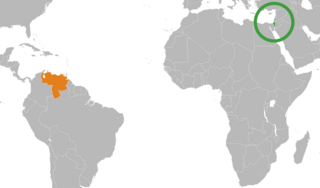
Israeli–Venezuelan relations refer to foreign relations between Israel and Venezuela. Both countries have no formal relations since 2009. Canada serves as Israel's protecting power in Venezuela through its embassy in Caracas, while Spain serves as Venezuela's protecting power in Israel through its embassy in Tel Aviv.
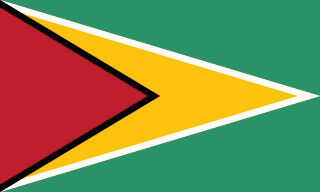
Guyana, officially the Co-operative Republic of Guyana, is a country on the northern coast of South America, part of the historic mainland British West Indies. Guyana is an indigenous word which means "Land of Many Waters". Georgetown is the capital of Guyana and is also the country's largest city. Guyana is bordered by the Atlantic Ocean to the north, Brazil to the south and southwest, Venezuela to the west, and Suriname to the east. With a land area of 214,969 km2 (83,000 sq mi), Guyana is the third-smallest sovereign state by area in mainland South America after Uruguay and Suriname, and is the second-least populous sovereign state in South America after Suriname; it is also one of the least densely populated countries on Earth. The official language of the country is English, although a large part of the population is bilingual in English and the indigenous languages. It has a wide variety of natural habitats and very high biodiversity. The country also hosts a part of the Amazon rainforest, the largest tropical rainforest in the world.

Stefanía Fernández Krupij is a Venezuelan journalist, model and beauty queen who won the Miss Venezuela 2008 and Miss Universe 2009 titles. She earned a Guinness World Records by being the first Miss Universe winner who was crowned by a compatriot.

The proven oil reserves in Venezuela are recognized as the largest in the world, totaling 300 billion barrels (4.8×1010 m3) as of 1 January 2014. The 2019 edition of the BP Statistical Review of World Energy reports the total proved reserves of 303.3 billion barrels for Venezuela (slightly more than Saudi Arabia's 297.7 billion barrels).
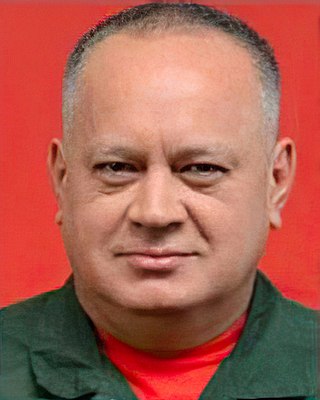
The 2010 parliamentary election in Venezuela took place on 26 September 2010 to elect the 165 deputies to the National Assembly. Venezuelan opposition parties, which had boycotted the previous election thus allowing the governing Fifth Republic Movement (MVR) to gain a two-thirds super majority, participated in the election through the Coalition for Democratic Unity (MUD). In 2007 the Fifth Republic Movement dissolved and the United Socialist Party of Venezuela was formed as the leading government party. Nationally, the popular vote was split equally between PSUV and MUD, but PSUV won a majority of the first-past-the-post seats and consequently retained a substantial majority in the Assembly, although falling short of both two-thirds and three-fifths super majority marks.

The record of human rights in Venezuela has been criticized by human rights organizations such as Human Rights Watch and Amnesty International. Concerns include attacks against journalists, political persecution, harassment of human rights defenders, poor prison conditions, torture, extrajudicial executions by death squads, and forced disappearances.

Rafael Enrique Romo Pérez is a Venezuelan professional footballer who plays as a goalkeeper for Ecuadorian Serie A club Universidad Católica and the Venezuela national team.
Ana Elizabeth Mosquera Gómez is a Venezuelan model and beauty queen who was crowned Miss International 2010, becoming the sixth woman from her country to capture the Miss International title.
The 2009–2010 banking crisis occurred in Venezuela when a number of the banks of Venezuela were taken over by the government, after "the revelation that several banks owned by Hugo Chavez supporters were in financial trouble after engaging in questionable business practices. Some were seriously undercapitalized, others were apparently lending large sums of money to top executives, and at least one financier couldn't prove where he got the money to buy his banks in the first place." In November and December 2009 seven banks were taken over, accounting for around 12% of total deposits. In 2010 more banks were taken over. The government arrested at least 16 bankers and issued more than 40 corruption-related arrest warrants for others who had fled the country.
Venezuela has experienced a marked deficit in the generation of electrical energy. The immediate cause of the energy crisis was a prolonged drought that caused the water in the reservoir of the Simón Bolívar Hydroelectric Plant to reach very low levels. Although various measures were taken to overcome the crisis, one of the most controversial was the implementation of a program of electrical rationing throughout the country, except in the capital Caracas, which was ultimately officially suspended in June 2010, due to the recovery of reservoirs due to the rains, and not to interrupt the transmission of the 2010 FIFA World Cup. Power cuts have continued to occur in the interior of the country, although with less frequency and duration, this time driven by failures in other parts of the system. The situation of "electrical emergency" decreed by the government on 21 December 2009 was suspended on 30 November 2010; however, on 14 May 2011, after the country experienced two national blackouts, the government of Hugo Chávez announced a temporary rationing plan and acknowledged that the electricity system continued to face "generation weaknesses" that they did not expect to surpass until end the year.